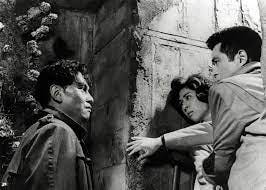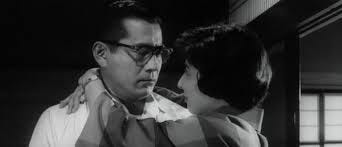After rewatching and then writing about a cinema classic featuring Akira Kurosawa’s direction and Toshiro Mifune’s acting, I decided to reprint an article from years ago. Today’s film is little seen and deserves a much bigger audience. Please give it a try.
Japanese filmmaker Akira Kurosawa is one of the greats. Visual imagery, powerful story and unique perspective can be found throughout his career. His influence upon world cinema continues to grow. Today let’s look at one of his seldom seen triumphs that you might have missed!
1960’s ‘The Bad Sleep Well’ is a hidden gem from the acclaimed Japanese director. Loyal readers know of my appreciation for his films. I previously wrote about another over-looked film of his, ‘Dersu Uzala’. After watching this film I wonder why this movie has been passed over. Kurosawa is best known for his samurai films, especially 'The Seven Samurai', and for his Shakespeare adaptations. This has the feel of both of those elements without the costumes and historic settings.
‘The Bad Sleep Well’ is set in post-war Japan. Kurosawa favorite Toshiro Mifune portrays 'Nishi', a man who is the suck-up secretary to the Vice President of a major land development corporation. We join the story at Nishi's wedding to the disabled daughter of his boss. The V.P. is wonderfully played by Masayuki Mori while Kyoko Kagawa impresses as his daughter. Mori’s understated evil is menacing and disturbing. Terrific acting. Everyone believes that Nishi has married this woman to further his career at the corporation. But he cares not for his career. It is vengeance he seeks!
We come to learn that Nishi is actually the illegitimate son of a man who committed suicide to save embarrassment for this V.P. during a scandal involving bribes and kickbacks. Japan has quite a "face saving" corporate structure and you were expected to kill yourself before allowing disgrace to fall upon your employer. Nishi blames the officers of the company for the death of his father. He wants to expose their wrong doings and bring them to justice. Of course, without evidence this is difficult. So he has spent years working his way into the good graces of his boss and he gets a top-insider job. He wants them to pay. Pay for their years of graft and corruption and to pay for his father's death.
The film is the striking story of Nishi's manipulations of the players in his quest for justice. By working so closely with the executives he has learned many secrets. He uses those secrets to apply pressure on the corporate officers. He has been supplying clues to the local police, but they can not gather the evidence necessary for any convictions. Nishi must force "the bad" to confess. He uses all kinds of subterfuge, threats and manipulations. He comes to realize that he too has become one of the bad. But does his end justify his means? That is for you to decide.
This is a terrific movie. Film noir with gritty suspense, great acting and directing and Kurosawa's wonderful use of imagery. ‘The Bad Sleep Well’ is moody, sinister and enlightening all in one package. Enjoy Kurosawa’s genius in one of his greats! Below is an extensive spoiler alert. Please do not read any further if you wish to remain unaware of the film’s finer points and details.
SPOILER ALERT
There are three main points of debate about this fantastic film. Did Kurosawa borrow from Shakespeare's Hamlet for this movie? Is the opening sequence properly connected with the rest of the film? What about the ending?
Many critics compare this movie with 'Hamlet', especially the third act of the play. While I can see the connection, and Kurosawa did often use the bard for inspiration, I think that the critics are much more interested in referencing Shakespeare than was Kurosawa. Yes, he probably found some ideas to be common with Shakespeare, but almost every traditional story has those as well. Close to everything written since the 17th century has something in common with Shakespeare. But the comparisons are primarily of tone not content.
The opening sequence of Nishi and Yoshiko's wedding is also much discussed in the cinema world. I found it to be an important insight into the culture of Japan at the time. The extremely formal language, attention to detail and stiff setting show us how stifled life in post-war Japan could be. We learn about how someone could be willing to kill themselves before allowing disgrace to fall upon his employer. I know of few today who would commit suicide instead of informing the police of the illegal actions of their boss. But that was Japan. Many critics feel that the tone of the wedding is very different from the rest of the film. With that I definitely agree, but weddings are different from the rest of our lives.
The ending. Wow! The courage it took for Kurosawa to end the film with such a twist is refreshing. The entire film points to one outcome and then we get slapped in the face. I relish when a filmmaker says "sorry, but all your expectations were wrong". I won't give details, but feel free to drop me a comment below to opine about your opinion of the ending. I think it was great.
Side note: this is one of Francis Ford Coppola’s favorite films. He has said that the wedding sequence in ‘The Bad Sleep Well’ had a big impact on his work on ‘The Godfather’.










These two make a great team. Thanks for reviewing their films.